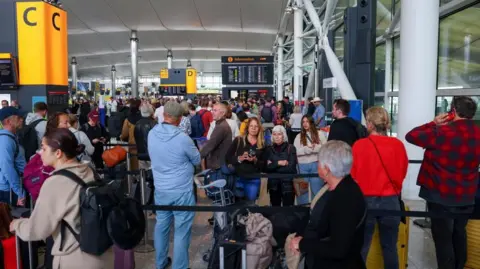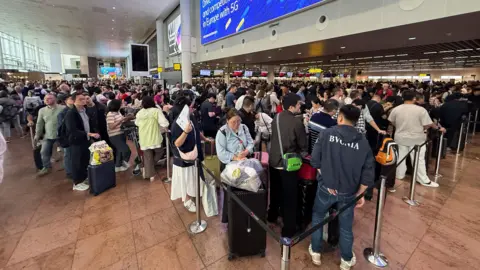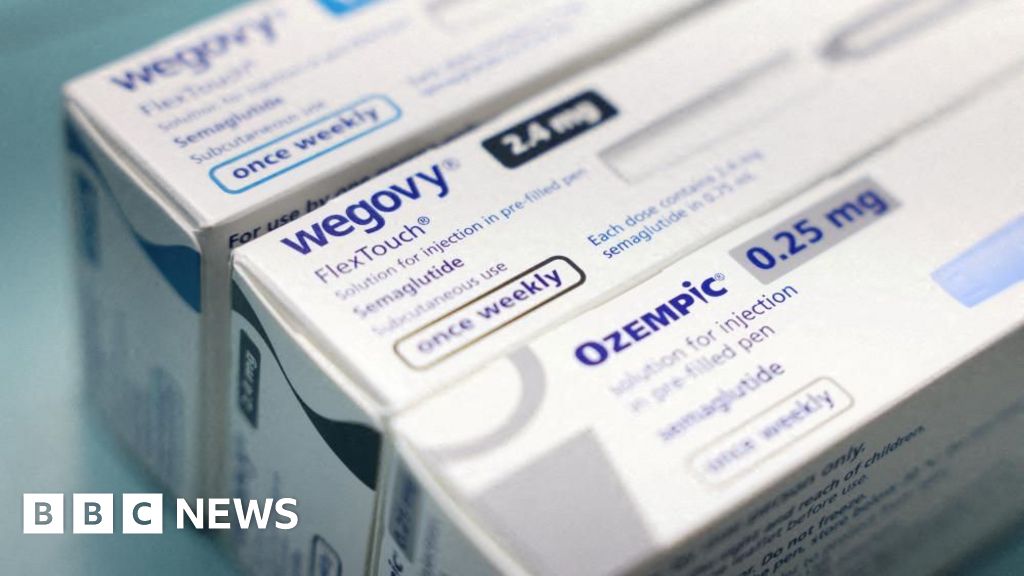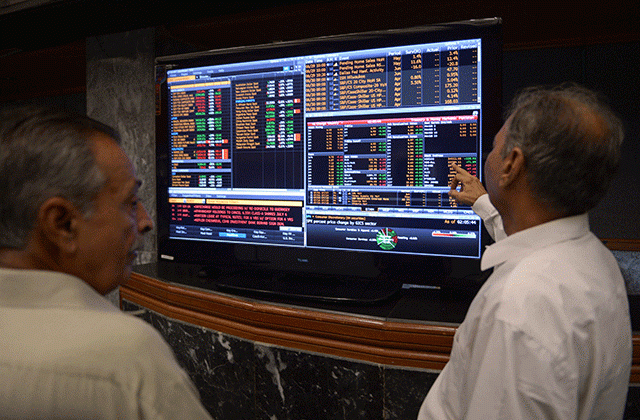Business
Heathrow cyber-attack: Airports warn of second day of disruption

Maia Davies and
Mitchell Labiak
Air travellers are facing another day of disruption at several European airports including Heathrow, after a cyber-attack knocked out a check-in and baggage system.
There were hundreds of delays on Saturday after the software used by several airlines failed, with affected airports boarding passengers using pen and paper.
Brussels Airport said it had “no indication yet” when the system would be functional again and had asked airlines to cancel half their departing flights for Monday.
RTX, which owns software provider Collins Aerospace, said it was “aware of a cyber-related disruption” to its system in “select airports” and that it hoped to resolve the issue as quickly as possible.
It identified its Muse software – which allows different airlines to use the same check-in desks and boarding gates at an airport, rather than requiring their own – as the system that had been affected.
The company has yet to disclose what went wrong or how long it expects the outage to last, but said on Sunday it will “provide details as soon as they are available”.
Brussels Airport said only manual check-in and boarding are possible “due to a cyberattack against Collins Aerospace”.
It added disruption would continue into Monday “because Collins Aerospace is not yet able to deliver a new secure version of the check-in system”.
Heathrow said on Sunday that efforts to resolve the issue were ongoing. It declined to say whether or not the issue was a cyber attack.
It apologised to those who had faced delays but stressed “the vast majority of flights have continued to operate”, urging passengers to check their flight status before travelling to the airport and arrive in good time.
The BBC understands around half airlines flying from Heathrow were back online in some form by Sunday – including British Airways which has been using a back-up system since Saturday.
There have already been more cancellations across Heathrow, Berlin and Brussels so far on Sunday than throughout Saturday, according to flight data firm Cirium, though not all of these are due to the cyber-attack.
There were hours-long queues on Saturday and some 47% of Heathrow’s departing flights were delayed, according to flight tracker FlightAware. Additional staff were at hand in check-in areas to help minimise disruption.
By Sunday afternoon, FlightAware data showed the number of delayed flights from Heathrow had fallen from levels seen on Saturday.
Virgin Atlantic, which operates from Heathrow, said it was “aware of a technical issue impacting check-in systems at a number of airports including London Heathrow which may result in some delays to departures”.
It added that “currently all Virgin Atlantic flights are scheduled to depart as planned”.
 Naomi Rowan
Naomi RowanNaomi Rowan, from Sudbury in Suffolk, was supposed to be moving to Costa Rica with her dog Dusty, but both are now in a hotel after their Air France flight from Heathrow on Saturday was affected by the cyber attack.
She said staff were boarding passengers with pen and paper due to the outage but told her they were unable to board Dusty without the electronic system.
“I had a cry, booked a hotel and managed to get through to Air France on WhatsApp, who say the next available flight for me is Monday,” she said.
 Reuters
ReutersEurope’s combined aviation safety organisation, Eurocontrol, said airline operators had been asked to cancel half their flight schedules to and from the airport until 02:00 on Monday due to the disruption.
Meanwhile, Dublin Airport said that while the technical issues persisted and some airlines were continuing to check in manually, it was expecting to operate a full schedule on Sunday.
A spokesperson told the BBC: “Passengers are advised to contact their airline directly for updates on their flight.”
Dublin Airport previously said that Cork Airport, which is owned by the same parent company, had experienced a “minor impact” from the cyber-attack – but Cork Airport has since said it has faced no disruption with all services operating as normal.
Berlin Brandenburg Airport is asking travellers to use online or self-service check-in instead of the desks while the outage is ongoing.
It said there had been 12 cancellations in and out of the airport on Saturday, but that delays were generally less than 45 minutes.
 Reuters
ReutersA National Cyber Security Centre spokesperson said on Saturday that it was working with Collins Aerospace, affected UK airports, the Department for Transport and law enforcement to fully understand the impact of the incident.
The European Commission, which plays a role in managing airspace across Europe, said it was “closely monitoring the cyber-attack”, but that there was no indication it had been “widespread or severe”.
Transport Secretary Heidi Alexander also said she was aware of the incident and was “getting regular updates and monitoring the situation”.
It was only last July that a global IT crash due to a faulty software update from cybersecurity firm Crowdstrike caused disruption to aviation, grounding flights across the US.
Analysts said at the time that the incident highlighted how the industry could be vulnerable to issues with digital systems.
Additional reporting by Rozina Sini
Business
Wegovy pill approved by US FDA for weight loss

The US Food and Drug Administration (FDA) has approved a pill version of the weight-loss drug Wegovy, according to pharmaceutical giant Novo Nordisk.
It is the first pill of its kind to receive approval from the regulator, marking a new era for weight-loss drugs.
Wegovy’s Danish makers Novo Nordisk said the once-daily pill was a “convenient option” to the injectable and would provide the same weight loss as the shot. It comes after Wegovy was approved by the FDA specifically for weight loss.
Others like Ozempic, which has similar weight-loss effects, were primarily approved for the treatment of Type 2 diabetes.
The BBC has contacted the FDA for comment.
The Wegovy pill showed an average weight loss of 16.6% during Novo Nordisk’s trials, the firm said on Monday.
A third of around 1,300 participants experienced 20% or greater weight loss in the same trial, it added.
The pill is expected to be launched in the US in early January 2026.
“Patients will have a convenient, once-daily pill that can help them lose as much weight as the original Wegovy injection,” said Mike Doustdar, the firm’s chief executive.
The pill version of Wegovy could give Novo Nordisk’s sales a boost after a challenging year which saw its shares slide as it warned over its profits.
The company has faced intense competition in the weight-loss market from rival drugmakers like Eli Lilly.
Novo Nordisk’s shares rose by almost 10% in after-hours trade in New York after the announcement.
Business
FDA approves first GLP-1 pill for obesity from Wegovy maker Novo Nordisk

The logo of pharmaceutical company Novo Nordisk is displayed in front of its offices in Bagsvaerd, on the outskirts of Copenhagen, Denmark, Nov. 24, 2025.
Tom Little | Reuters
The U.S. Food and Drug Administration on Monday approved the first-ever GLP-1 pill for obesity from Wegovy maker Novo Nordisk, a landmark decision that health experts say could open up treatment access to more patients.
Novo Nordisk said it expects to launch the pill in early 2026. The Danish drugmaker said starting in early January, the starting dose of 1.5 milligrams will be available in pharmacies and via select telehealth providers with savings offers for $149 per month.
That’s the same price that cash-paying patients can access the starting dose of the pill on President Donald Trump’s direct-to-consumer website, TrumpRx, under a deal Novo Nordisk struck with his administration last month. Trump’s site also launches in January.
Novo Nordisk did not say how much higher doses of the drug would cost, but said additional information on coverage and savings options for eligible patients will be available at that time as well.
Shares of Novo Nordisk gained roughly 9% in extended trading Monday.
The FDA’s approval also clears the pill for use to reduce the risk of major cardiovascular events, such as death, heart attack or stroke, in adults with obesity and established cardiovascular disease, according to Novo Nordisk. That’s consistent with the approval label of the company’s blockbuster weight loss drug Wegovy, which shares the same active ingredient, semaglutide.
The move gives Novo Nordisk a head start over chief rival Eli Lilly, which is currently the dominant player in the market and is racing to launch its own obesity pill. Pills are the next battleground for the two drugmakers, which established the booming GLP-1 space that some analysts say could be worth roughly $100 billion by the 2030s.
Wall Street thinks there’s plenty of room for pills in the market, with Goldman Sachs analyst saying in August that pills could capture a 24% share — or around $22 billion — of the 2030 global weight loss drug market.
“What we’ve learned through years of research is that having an oral option really kind of opens up, activates and motivates different segments to seek treatment,” Dave Moore, Novo Nordisk’s executive vice president of U.S. operations, told CNBC ahead of the approval. “To have that conversation with their doctor to see if this is something that might be right for them.”
“That’s what we’re excited about — to be able to give people an option and make sure we have access and ease of access like we have been doing with our injections,” he continued.
The approval is based on a phase three trial that followed more than 300 adults with obesity but not diabetes.
In that study, a 25-milligram dose of Novo Nordisk’s oral semaglutide helped patients lose up to 16.6% of their weight on average after 64 weeks, according to results from the trial presented at a medical conference in 2024. That weight loss was 13.6% when the company analyzed all patients regardless of whether they stopped the drug.
The pill appears to be slightly more effective than an experimental oral drug from Eli Lilly, which is still waiting for FDA approval.
But unlike Novo Nordisk’s pill, Eli Lilly’s treatment is not a peptide medication. That means it is absorbed more easily by the body and does not require dietary restrictions. People who take Novo Nordisk’s pill have to wait 30 minutes before eating or drinking each day.
Moore said the prices of the pill get costs closer to what some people are paying for unapproved, compounded versions of branded GLP-1s, some of which are still being illegally mass marketed and sold in the U.S.
Patients flocked to the cheaper copycats when Ozempic and Wegovy were in short supply over the last two years due to skyrocketing demand, or if they didn’t have insurance coverage for the costly treatments. During FDA-declared shortages, pharmacists can legally make compounded versions of brand-name medications. But the agency earlier this year determined that the shortage of semaglutide is over, barring the practice in most cases.
“It continues to be alarming and disturbing for us,” Moore told CNBC, referring to illegitimate ingredients that are imported into the U.S. illegally and used by some compounding pharmacies to create copycat versions of GLP-1s.
This is breaking news. Please refresh for updates.
Business
Paramount guarantees Larry Ellison backing in amended WBD bid

US film producer David Ellison arrives for Paramount’s “Transformers: Rise Of The Beasts” premiere in New York City on June 5, 2023.
Angela Weiss | Afp | Getty Images
Paramount Skydance on Monday guaranteed the backing of billionaire Larry Ellison in an amended offer for Warner Bros. Discovery — a clear response to questions raised by the WBD board of directors.
“Larry Ellison has agreed to provide an irrevocable personal guarantee of $40.4 billion of the equity financing for the offer and any damages claims against Paramount,” the company said in a news release.
Paramount said Ellison, the father of Paramount CEO David Ellison, has also agreed not to revoke the Ellison family trust or adversely transfer its assets during a pending transaction. The guarantee does not replace committed funds from RedBird Capital and sovereign wealth funds, but constitutes a new layer of security for the commitments.
Paramount Skydance is offering $30 per share, all cash, for Warner Bros. Discovery in a hostile attempt that’s meant to rival an agreement with Netflix.
Last week, Warner Bros. Discovery Chairman Samuel Di Piazza told CNBC’s David Faber the board had concerns about the supposed backing of Oracle co-founder Larry Ellison in the bid.
“We were not confident that one of the richest people in the world would be there at closing,” Di Piazza said at the time. “Doing a deal is great; closing a deal is better.”
WBD earlier this month agreed to sell its studio and streaming assets to Netflix in a transaction valued at roughly $83 billion on an enterprise basis. Paramount wants to buy the entirety of WBD, including its portfolio of TV networks, and says its offer comes with an enterprise value of $108.4 billion.
Paramount notably did not increase its bid on Monday, reiterating that it believes the deal is superior, though Paramount did hike its proposed reverse breakup fee to match that of Netflix’s offer.
WBD confirmed receipt of the amended offer on Monday and said in a release it would “carefully review and consider Paramount Skydance’s offer in accordance with the terms of Warner Bros. Discovery’s agreement with Netflix.”
“What we’ve done in this amended filing is we’ve cleared the brush of obfuscation around the offer,” said Gerry Cardinale, founder and managing partner of RedBird Capital Partners, on CNBC’s “Squawk Box” on Monday.
RedBird is an investor in Paramount Skydance and has also committed to financing the proposed Paramount acquisition of WBD.
Cardinale said Monday that as part of the amended filing Larry Ellison would back the bid through an irrevocable trust, which is anchored by 1.2 billion Oracle shares.
“Like we’ve done through the six bids that we’ve made, we are being responsive to what their concerns are,” Cardinale said.
Shares of Warner Bros. Discovery rose 3% in early trading Monday, while Paramount gained more than 7%. Netflix’s stock was down nearly 1%.
Paramount vs. Netflix
Paramount made three offers for WBD in the fall, which were all rejected by the company. WBD then launched a formal sale process that brought in offers from other bidders, including Netflix.
Cardinale said Paramount’s unsolicited offers likely spurred WBD to open up to a sale, putting Paramount “a little bit on the back foot.”
During Monday’s CNBC interview Cardinale, like Ellison on CNBC last week, appealed directly to WBD shareholders.
“At the end of the day … the shareholders own this company. The board doesn’t own it. [CEO] David Zaslav doesn’t own this company,” said Cardinale. “This should be a lot more simple than it is. It’s very simple.”
Besides the question of value between the two bids, the question of regulatory approval has also been raised by Paramount as well as industry onlookers.
“The Netflix deal kills competition,” Cardinale said, adding that a combination of streaming platforms Netflix and HBO Max would create 420 million subscribers under one roof. “No wonder the constituents in the ecosystem — talent, creators, theatrical exhibitors — are losing their minds on this because they see the pricing power that they will create.”
Netflix co-CEOs Ted Sarandos and Greg Peters have said they are confident their deal would pass regulatory muster. Sarandos has also issued reassurances about the future of the theatrical slate for WBD under Netflix’s ownership.
At a conference earlier in December, Sarandos argued the Netflix offer for WBD’s assets would preserve jobs at a time of mounting layoffs across the industry.
-

 Business1 week ago
Business1 week agoStudying Abroad Is Costly, But Not Impossible: Experts On Smarter Financial Planning
-

 Fashion5 days ago
Fashion5 days agoIndonesia’s thrift surge fuels waste and textile industry woes
-

 Business1 week ago
Business1 week agoKSE-100 index gains 876 points amid cut in policy rate | The Express Tribune
-

 Business5 days ago
Business5 days agoBP names new boss as current CEO leaves after less than two years
-

 Sports1 week ago
Sports1 week agoJets defensive lineman rips NFL officials after ejection vs Jaguars
-

 Tech1 week ago
Tech1 week agoFor the First Time, AI Analyzes Language as Well as a Human Expert
-

 Tech5 days ago
Tech5 days agoT-Mobile Business Internet and Phone Deals
-

 Entertainment1 week ago
Entertainment1 week agoPrince Harry, Meghan Markle’s 2025 Christmas card: A shift in strategy






